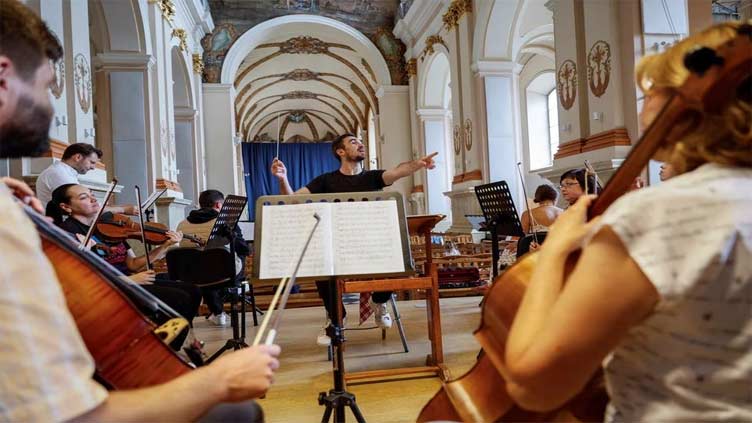Lviv's hottest ticket: a concert hall resurrecting Ukraine's repertoire

Entertainment
Music has always helped people, ever since ancient times
LVIV (Reuters) - At a concert hall in western Ukraine, a classical music programme resurrecting lost and neglected works of Ukraine's repertoire is packing the house nightly, often featuring a resident orchestra that fled the war zone.
Air raids occasionally interrupt the concerts, and musicians have played by candlelight during power cuts, but the Organ Hall in the city of Lviv - in a stately 17th century former Catholic Church - has become one of the hottest tickets in town.
Performing during the war means tighter budgets, longer hours and quadruple the effort, said the hall's co-director Taras Demko. But people need it more than ever.
"The terrorist attacks from Russia are constant," Demko told Reuters. "We need to support people who need, at least a few minutes a day, some kind of peace of mind."
The hall's resident orchestra is the Luhansk Philharmonic, which moved twice to escape war: first to the small eastern city of Sievierodonetsk in 2015 after its home city was captured by Russian-backed separatists, and then to Lviv last year when Sievierodonetsk was lain to waste by Russian invaders.
/cloudfront-us-east-2.images.arcpublishing.com/reuters/66F3X346Y5ILNLEY3JZEJH2KEE.jpg)
Orchestra director Igor Shapovalov says he often recognises people in the audience he once saw at concerts back east.
"Music has always helped people, ever since ancient times," Shapovalov said. "For some, it offers confidence. For some, psychological healing."
A varied programme means the hall averages more than one concert a day. More than 30,000 tickets were sold or donated in the first seven months of this year, more than in all of 2022.
The hundreds of thousands of Ukrainians who have settled in western Ukraine after fleeing fighting in the east and south can request free tickets. About a third of the audience is made up of people displaced by the war.
Though Lviv is hundreds of miles from the front lines, it is still a huge challenge keeping the concert hall running in a country under siege. When concerts are interrupted by air raid sirens, patrons are ushered into a windowless corridor.
Last winter, staff learned to rig the electric-powered organ to a generator during outages caused by attacks. Candle-lit concerts have proven so popular that they continued even after power was restored.
In early July when 10 people were killed in a Russian missile strike on a residential building in Lviv, the Organ Hall cancelled that night's choral concert.
The hall spotlights Ukrainian music, including new compositions and little-known works. Many performances are recorded live and posted on YouTube to help the world learn of the work of Ukrainian composers.
/cloudfront-us-east-2.images.arcpublishing.com/reuters/5IGNLIOPQRJQRDCNRFISYIW5AA.jpg)
"Everybody plays Mozart, but who plays Kosenko?" Demko said, referring to Viktor Kosenko, a 20th century Ukrainian composer known for his lyricism.
Ivan Ostapovych, the hall's other co-director, was scouring archives for lost Ukrainian music when he stumbled across "Zorya", a satirical one-act opera by composer Ihor Sonevytsky that pokes fun at the treatment of artists under Soviet rule.
The only known performance of the opera was by students some time after the 1991 fall of the Soviet Union. It was given its professional world premier at the Organ Hall earlier this year.
In one aria, a soprano sings at a Communist Party meeting about a bird stretching its wings. The party secretary responds that the party is a more beautiful topic.
Performing such a piece in the 1960s when it was written could have been punished with imprisonment, Ostapovych said.
"Now we are re-establishing this music in our history."

